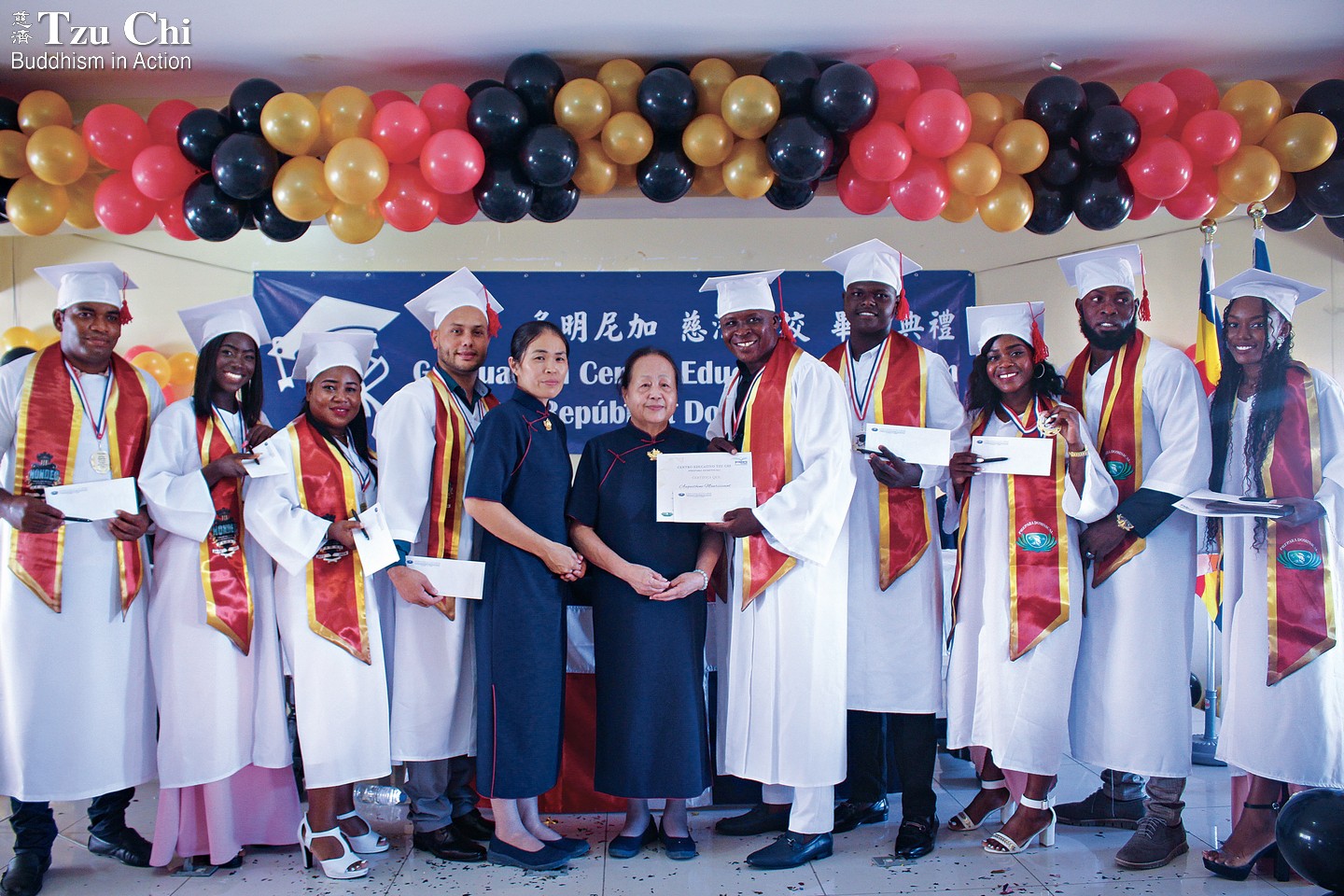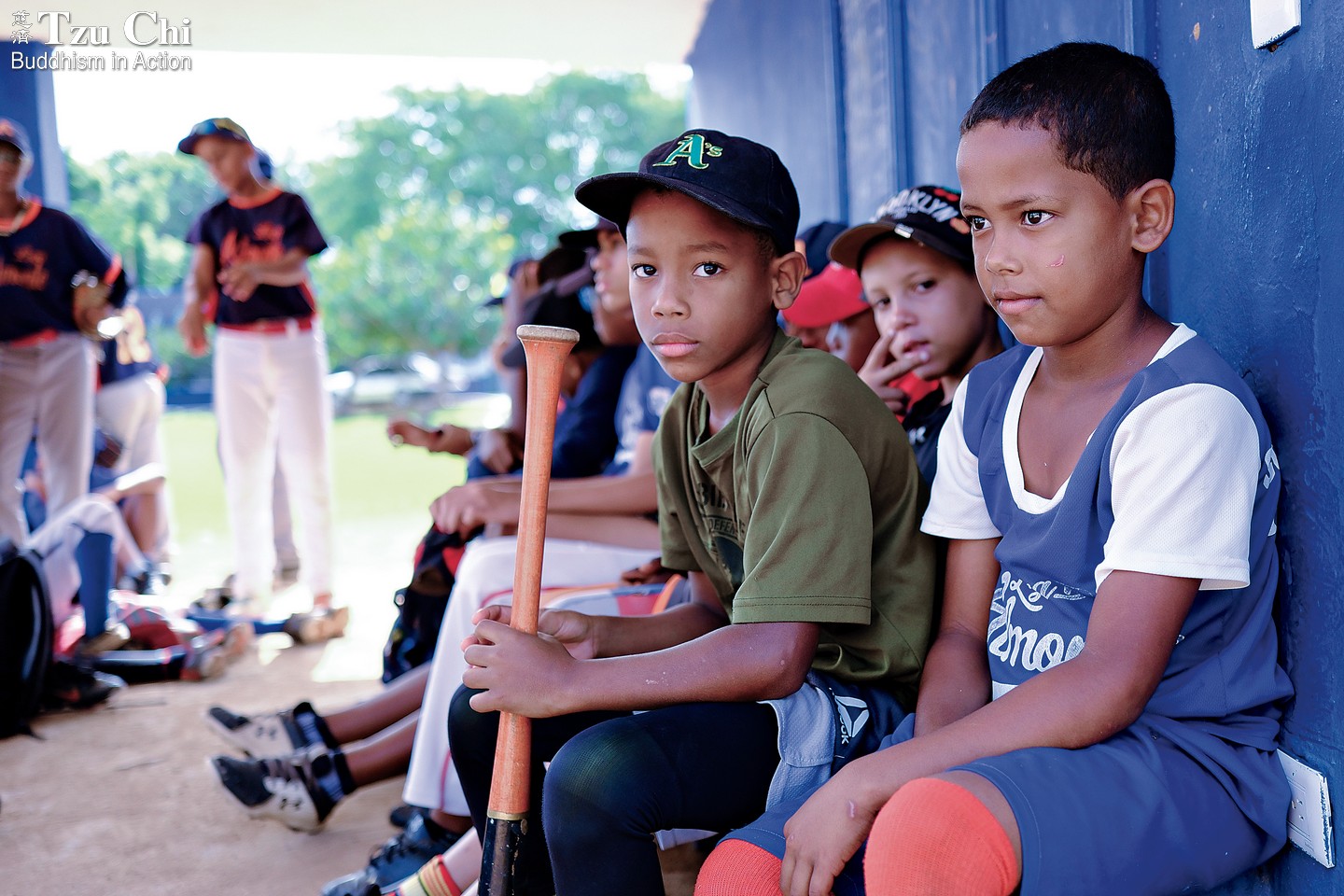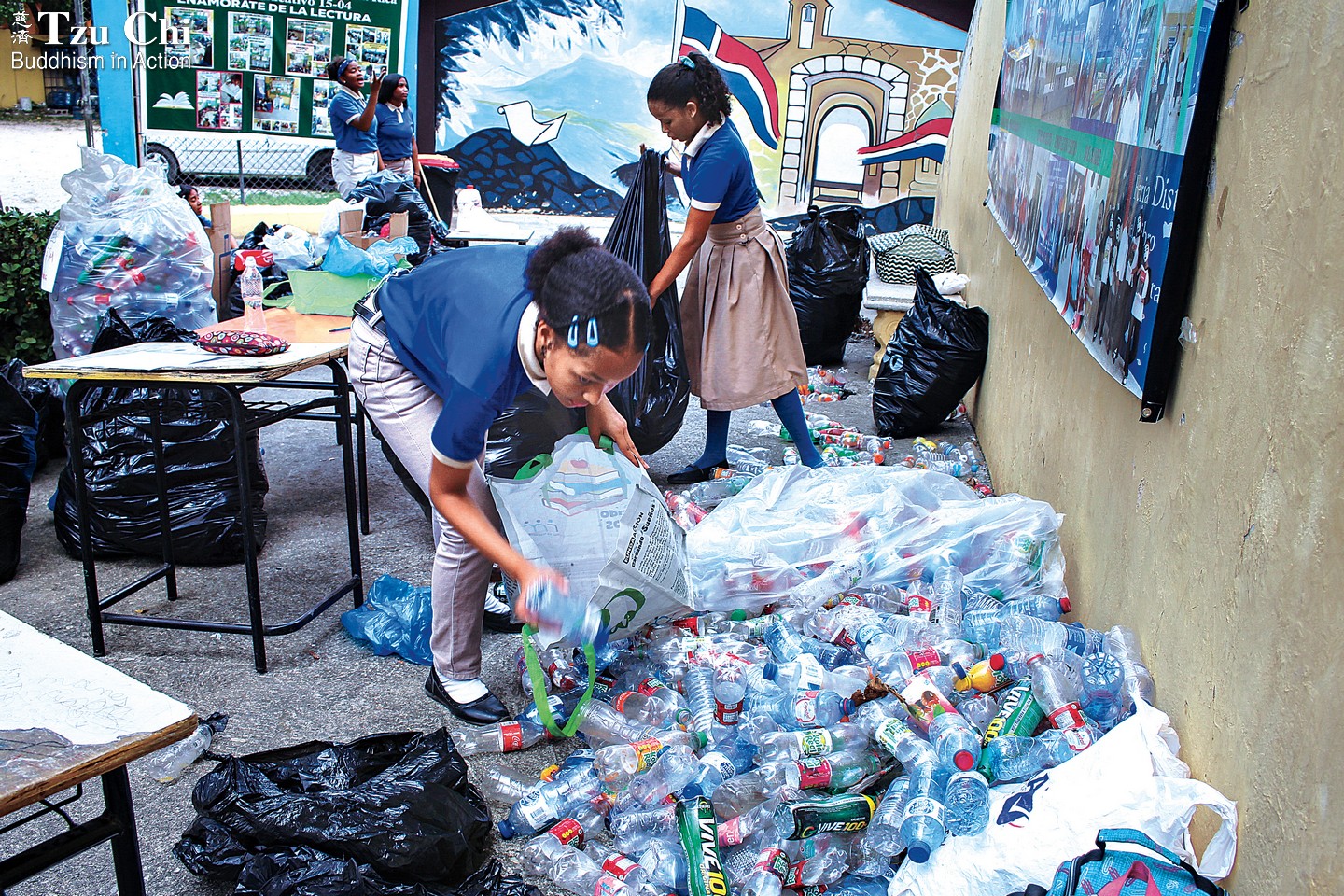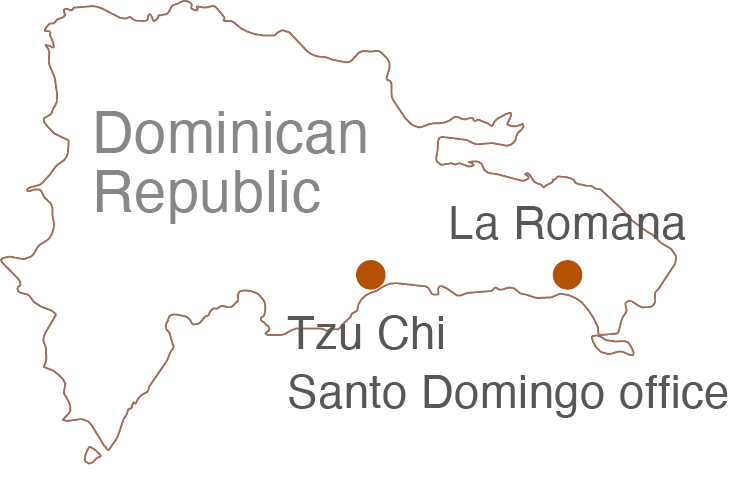By Lu Si-xuan
Translated by Wu Hsiao-ting
Photo by Yan Carlos
Tzu Chi La Romana School transforms lives through education in a country with high dropout rates.

This August, I traveled for the first time from Taiwan to the Dominican Republic. I was accompanied by a colleague, a Da Ai TV camera operator. The Dominican Republic covers an area of approximately 48,000 square kilometers (18,530 square miles), about 1.3 times the size of Taiwan, with a population of around 11 million, roughly half that of Taiwan.
I had the impression before visiting that the Caribbean island nation was vibrant and passionate, characterized by endless coastlines, sprawling coconut palms, and pristine white beaches set against azure waters—a true vacation paradise for many from Europe and America. Most people I’ve talked to in Taiwan, however, associate the country with its international fame in baseball. Many Major League Baseball (MLB) players hail from the country, and all MLB teams have established local bases to scout out and train young talent.
Baseball is the national sport in the Dominican Republic. In fact, the capital, Santo Domingo, boasts over a hundred baseball fields. While walking through the streets, I often saw children with bats, gloves, and baseballs in hand, using any available space as a makeshift ballpark. Despite their youth, they displayed remarkable power and speed in their throws and swings, often stopping me in my tracks to watch.
Baseball represents a way out of poverty for many Dominicans. The country’s gap between the haves and have-nots is stark. Many parents enroll their children in teams at a young age, believing that such training is a better option than letting them roam the streets. Coaches, too, actively scout for young talent and provide meals and lodging to help children focus on their practice.
Though teams only charge 300 pesos (US$5) per month per child, many families struggle to afford even this fee, relying on coaches to find resources and subsidies. For the children, training is a chance to stand out, and for the coaches, it’s a gamble—an opportunity to discover a player who could lead them to fame.
However, the chances of achieving fame are slim. Those who don’t make it to the international stage may obtain scholarships to study abroad or stay in the country to become coaches, nurturing the next generation of stars. When the hope of being a famous baseball player fades, education becomes the primary path out of poverty.
During my trip to the Dominican Republic, I came to realize just how important education is for an individual’s life, a family, and society.

Children wait for their turn to play at a baseball field in Santo Domingo, the capital of the Dominican Republic. Baseball is seen in the country as a path to success. Lu Si-xuan
Community challenges
We visited Los Ríos in Santo Domingo for an interview. The first thing that caught our eye were the tin houses, built to follow the land’s contours. The homes were packed so tightly that there was almost no space between them. Most residents here are undocumented immigrants from neighboring Haiti.
In 2022, a severe rainstorm caused significant flooding in Los Ríos. Floodwaters rose to the height of a whole story, completely submerging residents’ belongings. Following the flood, Tzu Chi volunteers conducted a disaster assessment and discovered that local drainage ditches had been clogged with garbage. Residents had been dumping waste—ranging from sewage to clothes, mattresses, and furniture—directly into the drainage system, causing blockages that overwhelmed the inadequate infrastructure during heavy rainfall.
Volunteers distributed food packages to support flood victims during this difficult time. To address the environmental issue, they launched a clean-home program, encouraging residents to keep their surroundings clean and take up recycling to reduce waste. This program has gained traction in the community over the past two years, with residents offering their homes as recycling points. The local Republic of Costa Rica School also participates in the program. They regularly hold recycling days and environmental competitions, with Tzu Chi providing school supplies and book bags as prizes, fostering healthy competition among children to practice environmental protection.
Another striking aspect of the Los Ríos area was the presence of many young mothers, each managing two or three children alone. The lively sounds of children laughing and playing filled the air in the community.
Rafaelina, 24, became pregnant at 15 and had to drop out of school—she couldn’t manage her studies during her pregnancy. Three years later, she had two more children. Both she and her husband were too young to provide adequate care and support, and they eventually divorced.
Later, Rafaelina met her second husband and became pregnant again. The family of six now survives on her husband’s income as a cement worker, earning about 20,000 pesos (US$335) a month. The couple had previously saved money to buy school uniforms for their three daughters but missed the registration deadline. By then, all the available spots had been filled. While the couple searched for another school, the children spent their days wandering around or playing at relatives’ homes.
The Dominican Republic’s education system comprises six years of primary school and six years of secondary school. All public schools are tuition-free. In recent years, the government has increased financial support, including subsidies for uniform costs, in hopes of improving school attendance rates. Despite such efforts, the dropout rate remains high. Poverty and teenage pregnancy continue to pose significant barriers, causing many young people to forgo education in favor of supporting their families.
I asked Rafaelina whether she wanted to return to school. She replied, “I really do. I used to love literature and writing, and with a good education, I could become a positive influence on my children.”

Students at Republic of Costa Rica School are encouraged to bring plastic bottles to school for sorting and recycling. Zhu Yao-lin
Education’s power
La Romana Province is over a hundred kilometers (62 miles) east of Santo Domingo. There, I met Fior D Aliza Rodriguez Solano, a 48-year-old woman who had put her education on hold due to pregnancy. After raising four children from two marriages, she eventually found more time for herself and returned to school to complete her studies.
Fior shared her love of learning, explaining how it broadened her horizons. She especially enjoyed social studies and the natural sciences. While she had always helped her children with their studies, they began studying together after she returned to school—a common sight in the country. “I’m so happy to return to my books. If I said that studying hadn’t changed me, I’d be lying,” she said, her voice trembling with emotion.
Reflecting on my own experience in Taiwan, where education is often taken for granted, I realized that for people like Fior, education is a hard-won dream. Achieving that dream requires overcoming financial difficulties and family obligations, as well as having the support of loved ones.
Fior graduated in August from the adult program at Tzu Chi La Romana School. “Because I married and had children, I devoted myself fully to my family,” she said. “But I always believed education could change my life.” On graduation day, wearing her cap and gown, she radiated confidence. In her speech representing her class, she acknowledged that without the school, she wouldn’t be the person she is today. She stood as a testament to the transformative power of education.
Tzu Chi La Romana School, offering kindergarten, primary, and secondary education, was established on what used to be a garbage dump. After Hurricane Georges wreaked havoc in La Romana in 1998, Tzu Chi volunteers arrived to assess the situation. During their trip, they were heartbroken to see children and adults rummaging through piles of trash in search of food. While providing emergency disaster relief, volunteers recognized a deeper need for a school in the community and decided to build one. Consequently, Tzu Chi La Romana School opened its doors in 2000.
Karina Ruiz Silvestre, one of the school’s first graduates, has witnessed the transformation of her community. She recalled how children once had to walk long distances to attend school, with some dropping out as a result. “After Tzu Chi built the school, children could attend school closer to home,” she shared. “The school also became a community hub where kids could play and study safely after classes, offering peace of mind to parents.” She further explained how Tzu Chi continually provides uniforms, teaching materials, and stationery, greatly easing the financial burden on families.
After graduation, Karina worked hard to earn her teaching license. In 2011, she returned to her alma mater as a substitute teacher. In 2022, she became a fully certified teacher. “Tzu Chi taught me the values of mutual care between teachers and students and the importance of environmental protection,” she said. “I am committed to carrying forward this mission, helping children in La Romana transform their lives.”
Reflections
Though my 20-day trip to the Dominican Republic tested my stamina, it left me feeling fulfilled. I could see the sense of accomplishment on our volunteers’ faces as their efforts were recognized once our news videos went live. I also realized that my work could help invigorate Tzu Chi’s charitable mission in the region. At times like these, my fatigue seemed to melt away.
Since Hurricane Georges in 1998, many ethnic Chinese volunteers have returned to Taiwan due to health issues. Yet their 25 years of dedication were not in vain—local volunteers have grown stronger. The foundation’s work in La Romana, for example, is not limited to education. Women and youth have engaged in charitable services, organizing hot meals for the disabled and elderly individuals living alone and distributing food packages to Haitian immigrants.
I was deeply moved by the Dominican volunteers’ enthusiasm, embodying a spirit of “Don’t leave me out when it comes to doing good.” I shared with them one of Master Cheng Yen’s teachings: “Those who give are blessed.” Watching Tzu Chi’s seeds of compassion and service take root in the Dominican Republic, I am confident they will grow into a flourishing forest of hope in the years to come.
Twenty-Five Years of
Tzu Chi Dominican Republic
Compiled by Tzu Chi Monthly editorial staff
Translated by Wu Hsiao-ting
In November 1998, U.S. Tzu Chi volunteer Debbie Chen (林慮瑢) led a team to conduct a follow-up assessment of the damage in the Dominican Republic after Hurricane Georges. In December, Tzu Chi distributed food to a thousand households in the hard-hit areas of Polo and La Romana. In February 1999, the foundation established its first Caribbean branch in the Dominican Republic. In 2000, Tzu Chi La Romana School was founded. Ten years later, night and Saturday adult classes were introduced to help reduce illiteracy, and students have successfully passed the eighth-grade national certification exam.
Over the past 25 years, local Taiwanese businesspeople and other members of the ethnic Chinese community have shouldered the mission of advancing Tzu Chi’s work in the Dominican Republic. Debbie Chen and her husband, Jackson Chen (陳濟弘), have also continued to support the Tzu Chi school. They are happy to have seen more than a thousand students graduate from the school and become contributing members of society. Tsai Yu-yun (蔡玉雲), the first head of Tzu Chi Dominican Republic, expressed her satisfaction in seeing that the ranks of local certified Tzu Chi volunteers now include both graduates of the Tzu Chi school and parents of students.
The site of Tzu Chi La Romana School was originally a garbage dump. The government leveled the garbage mounds that impoverished families relied on for survival and built a large planned community in their place. As word of the community spread, the population grew. The original Tzu Chi school site will now serve 500 secondary school students, and the government has constructed a new facility to accommodate 800 primary school students, set to be inaugurated this year.




